Let me introduce you to a promising rising star of the Sindhi community, Mr. Vijay Kanchan Gulabrai Nariyani. The double-barrelled name that he carries suggests his love and respect for both his parents, as he feels indebted to them for the wonderful life he has.
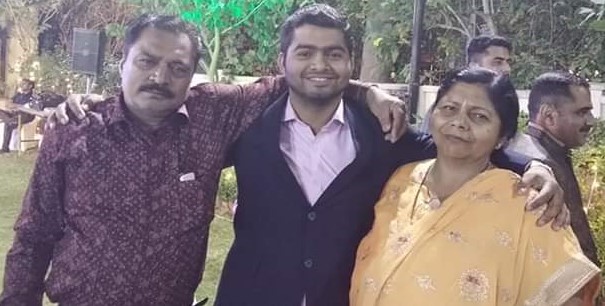
Born on 14th April 1994, in Baroda, Vijay is a young dynamic Sindhi, who has dedicated his life towards the revival and promotion of Sindhi culture and heritage. He is a freelance anchor, an actor, a director, a writer, a line producer and a choreographer in Sindhi and Gujarati Film Industry. He has taught the Sindhi language as a teacher through the National Council for Promotion of Sindhi Language and now helps his mentor, Shri Murli Bhojwani, in supervising the Sindhi language classes at Gujarat State level.
PIC : WITH PARENTS, SHRI GULABRAI AND SHRIMATI KANCHAN NARIYANI
Vijay also plans to enter the political arena of the country as he feels it will help him highlight the problems of the Sindhi community on a national platform.
An interview with him reveals his love and passion for his Sindhi roots and language. He is so determined and positive about fulfilling his goals that a ‘NO’ for him means Next Opportunity. He is an example of the heights one can achieve with dedication and determination.
A complete biodata of his activities is given at the end of the interview.
Here is an account of Mr. Vijay Kanchan Gulabrai Nariyani’s life, his career and his dreams in his own words.
My Family
“My ancestors are Amils from Sahiti, Sindh. Amils are the educated lot among the Sindhis, who worked as administrators for the Talpur Mirs, the rulers of Sindh, and later for the British who took over Sindh from the Talpurs.
Among the Sindhis, every sixth generation takes the surname based on the name of their ancestors. Our surname Nariyani comes from my great-great grandfather’s name, Naraindas.
My great grandfather, Shri Tehalram, was a thekedaar (a contractor) in Sindh.
My grandfather, Shri Prabhdas Nariyani, was born in 1935. During the partition of India in 1947, he was 11 years old. Following the looting and violence in Sindh after the partition, the family left Sindh and was put up in abandoned army barracks given by the government in Ulhasnagar, Mumbai.
They then shifted to Baroda, Gujarat. My grandfather got a job as a khalasi (peon) in the Indian Railways and later, he became a train engine driver. By then he was married and had children. The eldest son was my father, born in 1963. The family lived in railway quarters in the Yard provided to the railway employees.
The family later shifted to Sant Kanwar Ram Nagar of Warshiya, a Sindhi dominated area in Baroda, in 1984.
Shri Hemu Kalani was a Sindhi freedom fighter and my great grandfather had taken my grandfather when he was a young boy in Sindh to attend his meetings when Shri Kalani was propagating the idea of freedom of India from the Britishers.
My grandfather talked about the pujas and Lal Sain’s melas ( religious gatherings ) held on the banks of River Sindhu in Sindh. He also described the Sadh Belo in Sukkur. Sadh Belo is an island between Rohri and Sukkur on River Sindhu and is a pilgrim place visited by the Sindhi Hindus and Sikhs.”
My Studies
“I studied in a Sindhi medium school and did a Hotel Management course, which I had to leave after a year. Financial circumstances were such that I had to work from a very young age. My father, Shri Gulabrai Nariyani, did not get a job in the railways due to reservation of jobs, despite my grandfather’s efforts to get him one. I have done all kinds of jobs without any embarrassment, including working at chai ji laari (assisting street-side tea vendors).
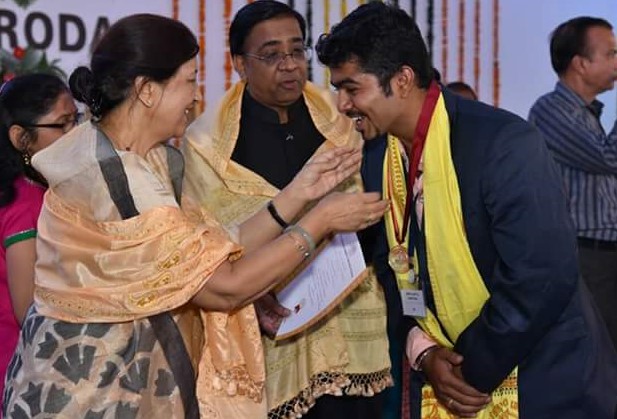
I decided to pursue my studies and joined Bachelor of Arts with Philosophy as my main subject, in English medium at M S University, Baroda. I was awarded a gold medal at the 65th Convocation of M S University, from the Chancellor, Rajmata Shubhnagi Devi Gaekwad of the royal family of Baroda, and the Vice-Chancellor of the University, Shri Parimal Vyas.
PIC: RECEVING GOLD MEDAL FROM THE CHANCELLOR , RAJMATA SHUBHANGI DEVI GAEKWAD AND THE VICE-CHANCELLOR, SHRI PARIMAL VYAS
I went on to study M A with Philosophy, followed by a Bachelor in Library Science, a one-year course.
I won all the elections held at the college level. I also arranged Cheti Chand( the Sindhi New Year) programs for 6 years at the University. I used to invite all the Sindhi Sant (saints) and other dignitaries. I ordered meals for everyone- biryani, chole puri, buttermilk, sherbet- for the Sindhi New Year.
I have also applied for MA in the Sindhi Language at Ajmer, but the Covid-19 pandemic has brought those plans to a halt. I will reapply next year, by which hopefully the pandemic would have subsided.”
My Work
“I worked in Sindhi, Gujarati and Hindi films as well as Sindhi and Gujarati theatre and participated in events wherein I made tableaus featuring Sai Baba and Jhulelel.
I have written scripts for Sindhi plays too. Naresh Udani, a Sindhi film director, scriptwriter and songwriter from Ahmedabad, was planning to start two new films in 2020 in which I was supposed to feature. But the movies are postponed now due to the pandemic.
I am now working as a medical representative at a pharma company. I also help Shri Bhojwani to supervise the Sindhi language classes that he runs for The National Council for Promoting the Sindhi language (NCPSL) at the Gujarat level. I have worked as a Sindhi teacher for this program for four years.”
Sindhi Film Industry
“I have written a script for a Sindhi feature film, Ma Tuhinjo Tu Muhinji ( I am Yours and You are Mine). The problem with making Sindhi films is there is no Sindhi Film Industry that supports them. There is no one to finance or distribute them. We do not get any support from the government in this matter. We have millionaires and billionaires among Sindhis, but we still don’t have our Sindhi TV channel.”
My Duty Towards My Community
“I consider it my duty to pay my debt towards my rich Sindhi heritage and language. Look at the picture of Lal Sain (Jhulelal). He looks so resplendent in his royal crown and shimmering clothes. We Sindhis are fortunate to have been born in a community with such a rich and prosperous heritage. I want to be reborn in a Sindhi household. My grandparents and parents as well as my mentor, Shri Bhojwani, have told me stories of our culture, which makes me proud of my Sindhi roots.”
VIDEO: URGING SINDHIS TO SPEAK IN THEIR MOTHER TONGUE
My Views on Today’s Sindhis
“The Sindhis have adapted so well to the regions and countries they have settled in that they have forgotten their own culture and heritage. The joint families are still able to retain their Sindhi way of life, but nuclear families are not able to do so.
We were around 25 members in our family during my grandfather’s time. When I was young, there were 15 of us. But today, with my grandparents no more and with my paternal uncles living with their families on their own, and my sister getting married, there are only 3 of us living together- my parents and I.
It infuriates me that under the influence of the western culture, we Sindhi families want to live independently and are giving up our Sindhi custom of living together.”
My Wish to Visit Sindh
“There is an understanding between India and Pakistan that groups, not individuals, from both countries, can be allowed to visit their religious shrines in each other’s country. Muslim groups from Pakistan visit Khwaja Sharif in Ajmer or Haji Ali in Mumbai. Similarly, Hindu Indians visit Sindh and other shrines in Pakistan in groups.
Sai Yudhishtar Lal of Shadani Darbar in Raipur takes around 300 Sindhis for Sindh Darshan (a tour to Sindh) every year. My mentor, Shri Murli Bhojwani, and a few of us in Baroda had planned to go this year with the group, but the tour got cancelled due to the Covid-19 pandemic.
I have no plans to go to any other country, but I am keen to visit Sindh. I want to see my ancestral homeland and visit Larkana, Sukkur, where my maternal grandparents belong, and Sadh Belo.”
The Promoters of Sindhiyat
“Asha Chand is an important crusader working for Sindhis and the revival of the Sindhi culture. Her parents were prominent figures in Sindhi literature- her mother was Shrimati Sundari Uttamchandani, a Sahitya Akademi award winner writer, and her father Shri A J Uttamchandani, an outstanding writer, a critic, a research scholar and a journalist. She is now in her seventies, but she still works untiringly for the Sindhis. She runs Sindhi Sangat, a channel promoting Sindhis, and has made an app to learn the Sindhi language, among many other activities.
Bhavna Rajpal of Sindhi Film Festival is another important figure on Sindhi platform working for reviving and promoting our Sindhi heritage.”
Sindhi Festivals and Other Important Days
“We observe Chaliyo Sahib in memory of Lal Sai (Jhulelal) for forty days in July- August and refrain from having onions or garlic during this period. We wake up early before dawn in the lunar month of Kartak and join the prabhat pheris, the procession of devotees that moves around the neighbourhood singing bhajans to wake up the other devotees. We also worship the Tulsi plant and celebrate Tulsi Vivah (the wedding of Goddess Tulsi with the stone form of Vishnu, Saaligram) on Vadi Gyaars – the 11th day of Kartak.
Many Sindhi festivals like Cheti Chand and Janmashtami are celebrated at Prem Prakash Dharam Tirth Satnamsakhi Darbar, Baroda. Sindhi singers such as Lata Bhagtiani, Jatin Udaasi, Parmanand Pintu are invited to participate in the programs celebrating Cheti Chand. There is an arrangement for buffet meals for all the Sindhis attendees.
Chaliyo is celebrated by a Sindhi organisation where bhandaro (free meals for everyone) is arranged twice a day for forty days.
Sindhi festivals like Ghoghro and Vadi Satte- Nandi Satte (festivals that fall in the lunar month of Shravan) are observed in the house. My mother makes around 20-25 dishes for Satte from dal pakwan, lady’s finger, puris, pakoras, mirch pakora, pau bhaji, raita, khatto bhat (sour curd rice), sweets to kheechas (fryums) and papads.
I go to play garbas for Navratri for the entire night at events held at party plots. I have won many awards for my dance at these events. At home, we observe the food restrictions for Navratri.
Lal Loi, which falls on 13th January every year and Holi is also celebrated in my family.
On 21st February, International Mother Tongue Day, we organise Sindhi Unity Marathon in Baroda. On 1st November we observe Bhagat Kanwarram’s Shahidi Diwas. On this day, he was shot by terrorists at Ruk railway station, Sindh. Till today, the railway is abandoned and desolate since the day he attained martyrdom there.
At home, we have Sindhi foods such as koki ( a spicy whole wheat flatbread – a Sindhi specialty), besan tikki ji bhaji ( masala gram flour tikki in an onion-tomato gravy), modlaan ji bhaji (gram flour koftas in an onion- tomato gravy) and bheey batata ji bhaji ( a dish made of lotus stem and potatoes). At festivals, we have sweets such as seero and malpuas. I like dal-pakwaan, Sindhi pakora, phoolpatashan ji bhaji ( popped lotus seeds in an onion-tomato gravy) and moong ji dal jo seero.
My mother also makes Sindhi pickles like gajjaran ji khatain (carrot pickles) and bassaran ji khatain (onion pickles).
We observe Shraadh in the memory of the ancestors who are no more and feed young girls. My mother makes Sindhi curry – rice for the Shraadh.”
My Leadership Goals for the Sindhi Community
“I am associated with ward 6 of the political party, BJP, in Baroda. I believe that I can work for the welfare of my Sindhi community if I am part of the government of the country. I want to stand for elections in the future and am obsessed with getting into a position of power in the government so that I can represent the Sindhi community.“
Sindhi Religious Places and Food in Baroda
“Lila Shah Dharamshala, the temple of Lal Sain, Sant Satram Das ji Dharamshala, Darbar of Sai Yudhishtar Lal of Raipur are some of the Sindhi shrines in Baroda.
Warshiya area of Baroda has vendors selling Sindhi snacks such as dal-pakwaan, pakora, malpuro, seero, boondi-patata, mirch pakora and Sindhi bhel.”
List of achievements of Mr. Vijay Kanchan Gulabrai Nariyani
- Ex CR (Class Representative), Ex FR (Faculty Representative), Ex FGS( Faculty general Secretary- all elected positions at Faculty of Arts, MSU, Baroda, Gujarat
- BA and MA in Philosophy, awarded a gold medal at the 64th convocation of M S University
- Studying for an MA in Sindhi
- Assisting in supervising Sindhi classes in Gujarat state run under the aegis of NCPSL
- An active member of Kanwar Sindhi Kala kendra
- Vice President of Yuva Wing of Bhartiya Sindhu Sabha, Baroda
- National Vice Chairperson of Quest team of Vishwa Sindhi Sewa
- An active volunteer at Prem Prakash Dharam Tirth Satnamsakhi Darbar
- Worked in Sindhi, Gujarati, Hindi, Bhojpuri feature films, serials, short films
10.Makes commercial video ad films and photoshoots at the local level
10.An actor, director, scriptwriter, choreographer, freelance anchor
11. A social worker
Personal Account of Mr. Vijay Kanchan Gulabrai Nariyani
Pics And Videos: Personal Collection of Mr. Vijay Kanchan Gulabrai Nariyani
Jyoti Mulchandani
Ahmedabad
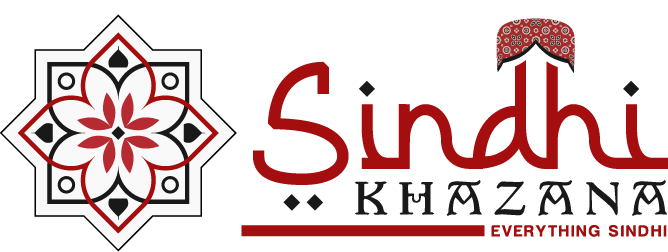
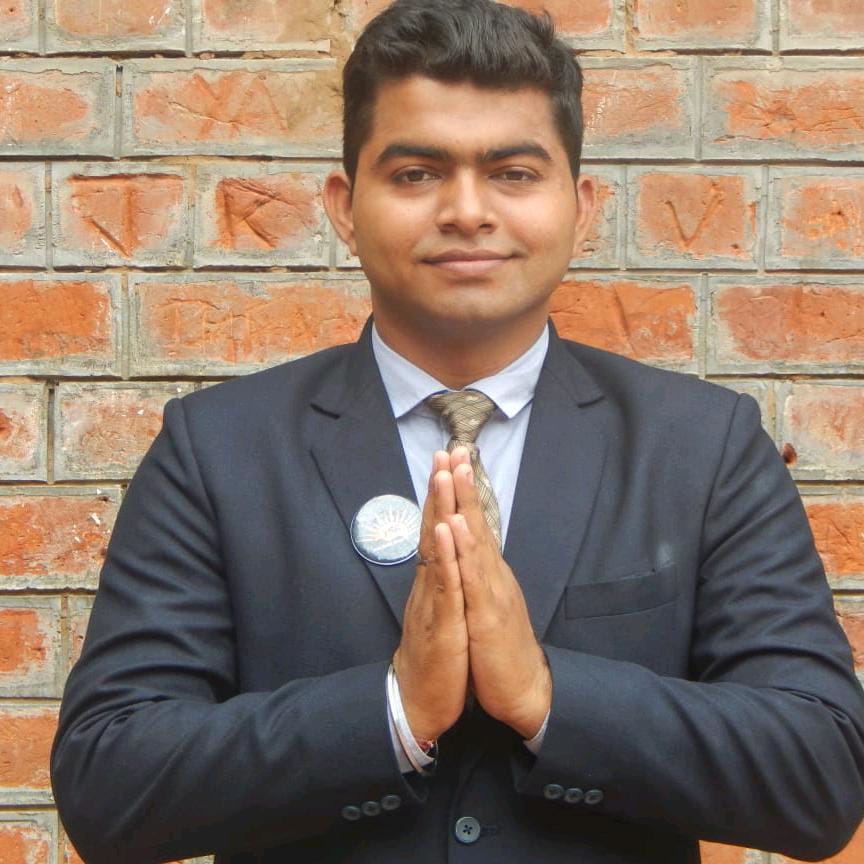
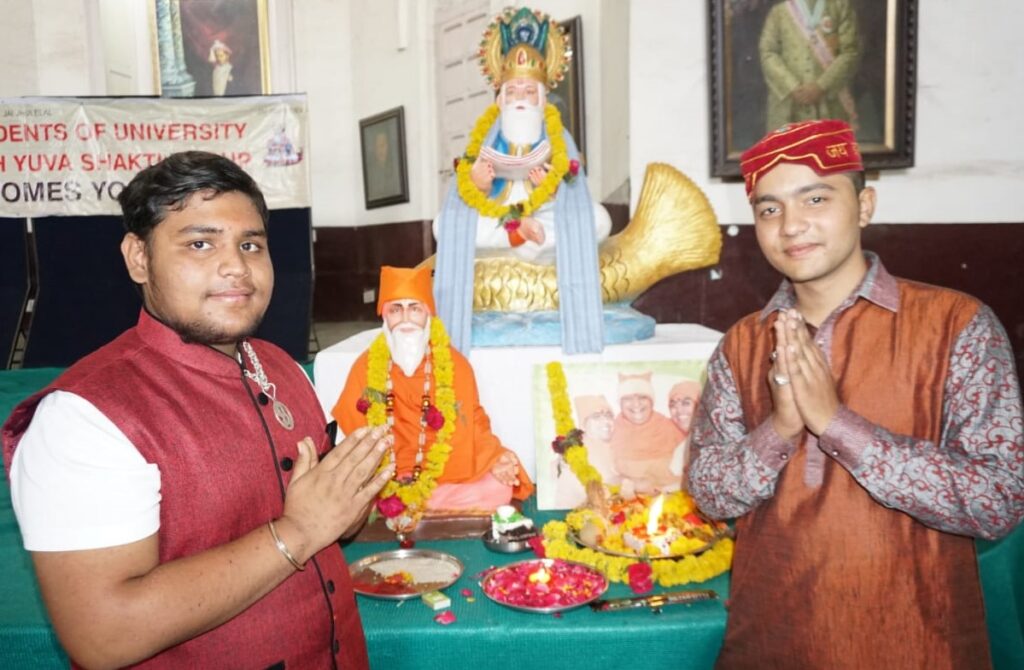
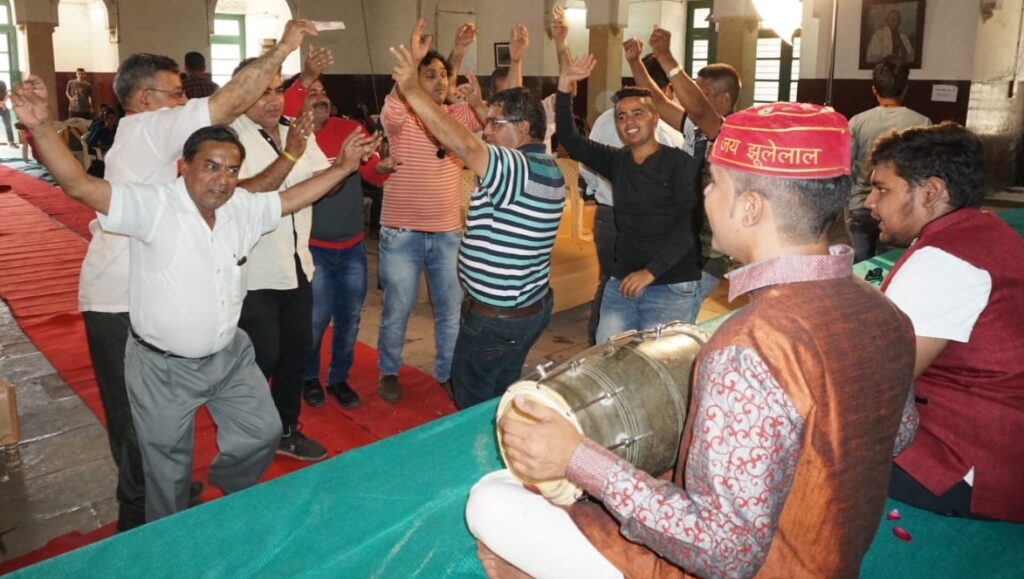
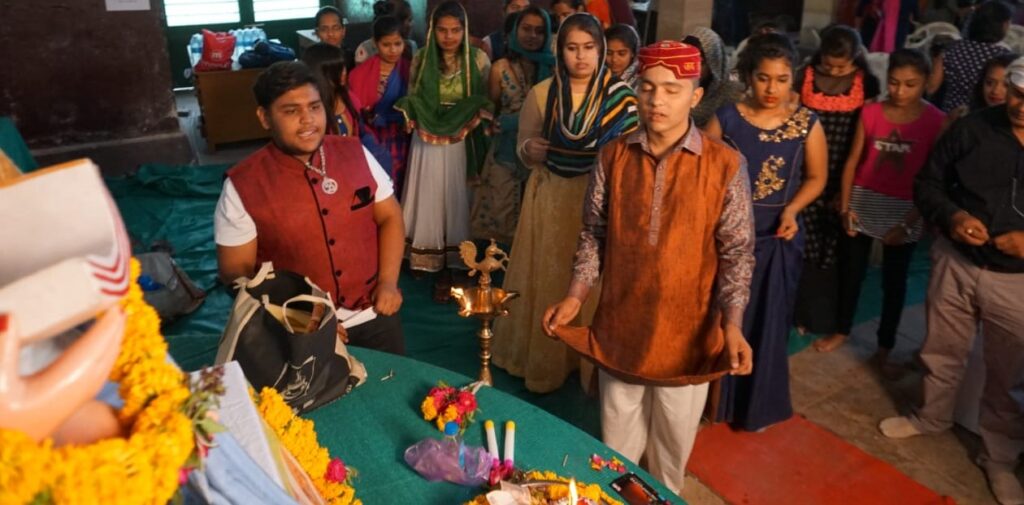
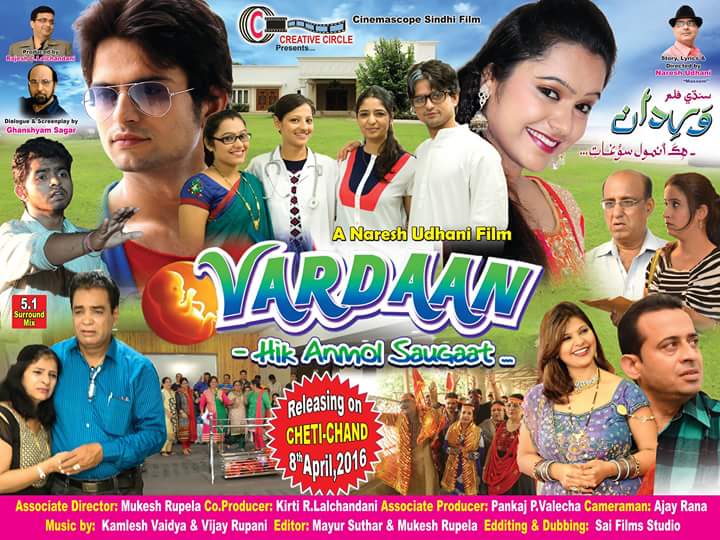
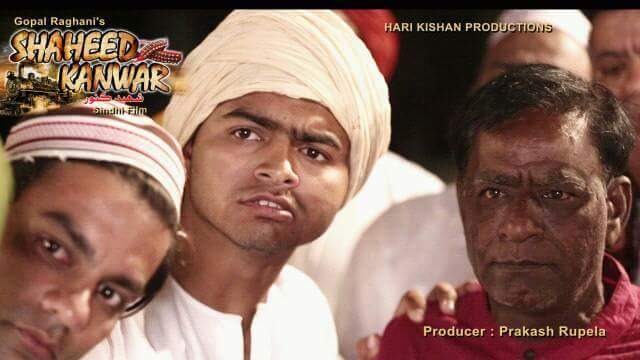
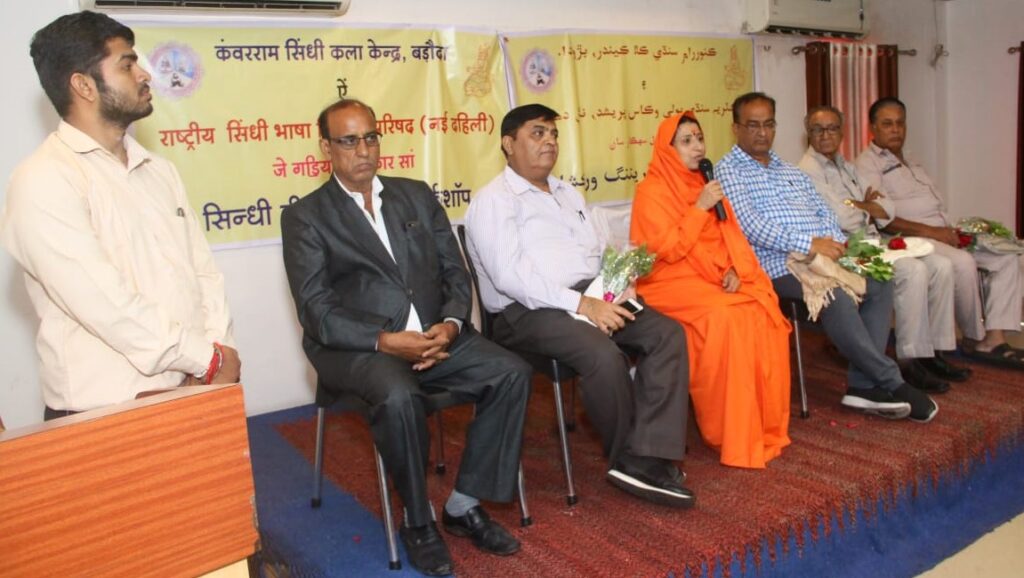
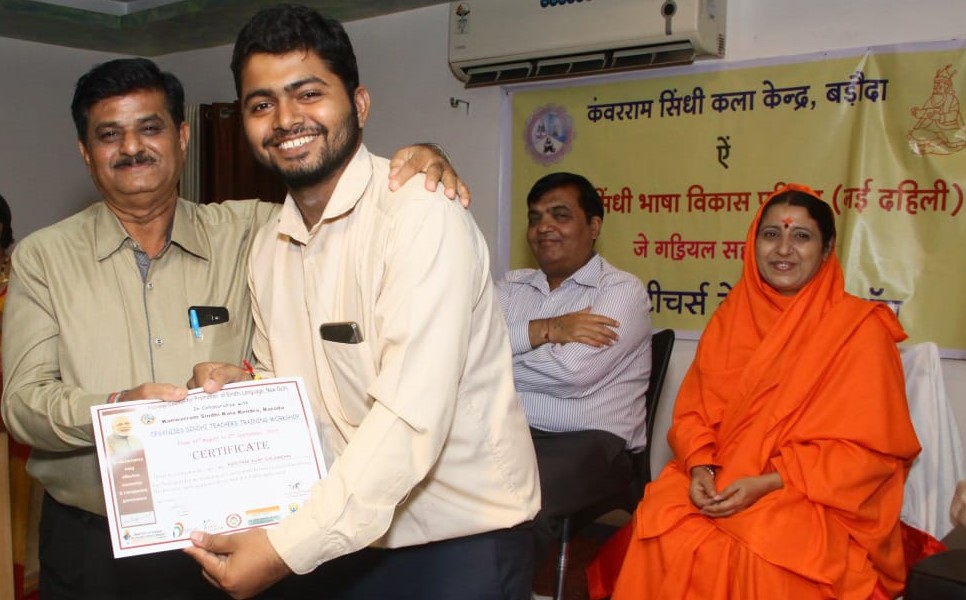
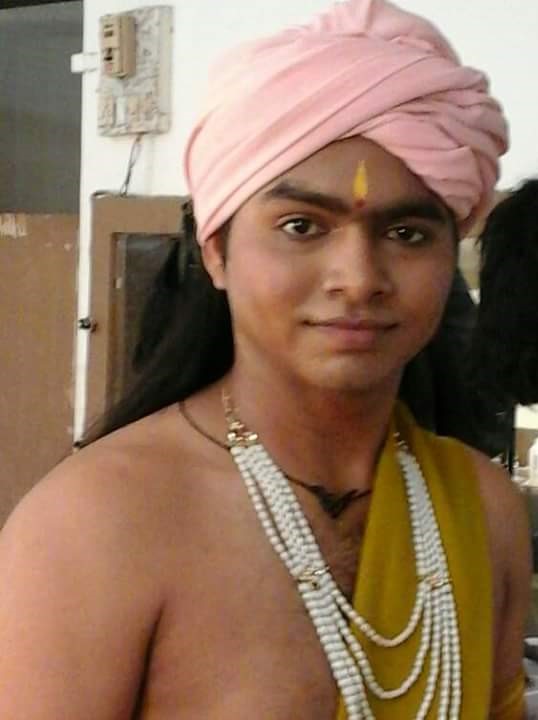
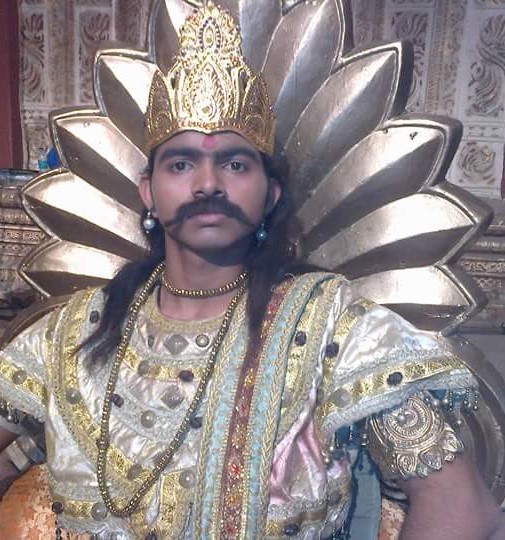
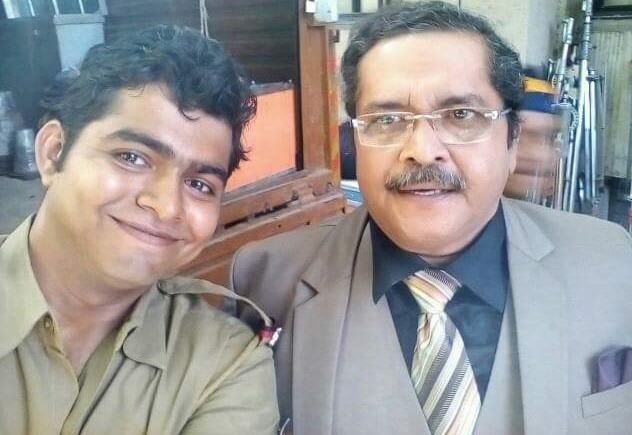
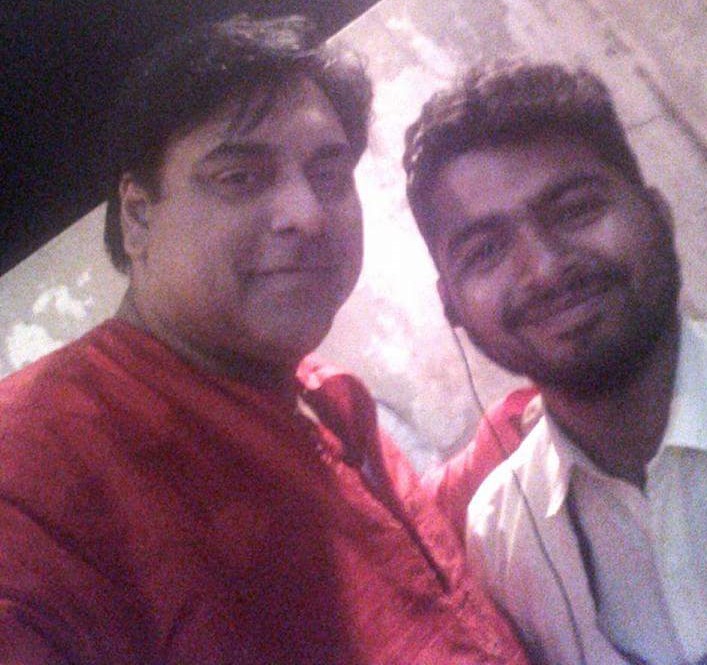
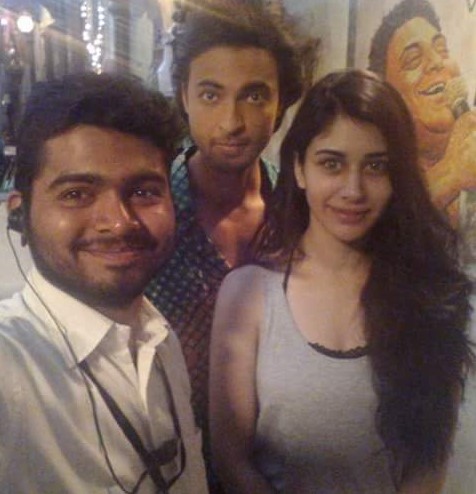
Give a Reply